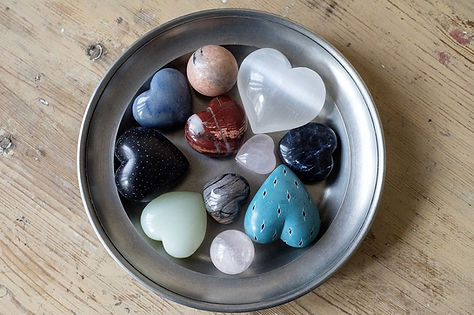24 HOUR TRACKED DELIVERY

Crystal care
Ever wondered how to care for your crystals?
Ever questioned where to position them to prevent damage?
Have you ever considered if they can be washed?
Then this is the page for you!
Below will be plenty of information for you to check out and learn how to really care for your crystals, big and small, hardy and fragile!

Crystal Durability
The scale we use to measure the hardness of a crystal is known as the Mohs scale, this scale can help indicate how to store a crystal, how likely a crystal is to damage based on various items and can help determine a crystal's ability to withstand water.
The lower the number the crystal is rated at on the scale the more delicate and damage-prone the crystal would be. Examples from the scale are a diamond at a rating of 10, whilst Quartz scores a 7 and respectively calcite scores a much lower 3.
The scale also indicates which crystals could damage others, We can work this out by comparing where each crystal fits into the scale. Simply put a diamond can damage anything lower than a 10, quartz can damage anything lower than a 7 and calcite anything lower than a 3. This pattern is true for any and all minerals and crystals that the scale applies to.
I sometimes refer to the scale when considering what pieces of crystal jewellery I can wear together such as chip bracelets and also when deciding how to store my crystals and what can be stored together.


Crystals and the Sun
Where to store crystals can be vital if you want to sustain the vibrancy of colour and quality of the crystal. Some crystals simply do not like direct sunlight for prolonged periods, some crystals when left in the heat for prolonged periods can become brittle and crack, whilst others are not affected.
Although the sun can be a great way to cleanse crystals, there are many more safer ways to do so.
Opaque crystals such as obsidian (with some exceptions) are usually safe in direct sunlight while more translucent ones such as quartz are not and can lose colour after around 4 hours of exposure.
When leaving crystals in windows we don't need to consider as much the UV rays, but we should consider the possibility of fires, if a crystal focuses the heat from the sun on an item that is flammable it is entirely possible that your crystal could cause a disaster!
For this reason, I don't like to leave crystals such as selenite, Quartz or any translucent shapes, especially spheres in my windows.
Some sun-safe crystals include but are not limited to Moonstone, Black obsidian, Lapis, Jade and Sunstone.
Some Crystals that should not be left in the sun for prolonged periods include but are not limited to Sapphire, Opal, Flourite, Calcite, Citrine and Amethyst.


Crystals and Water
Whilst water is another popular way to cleanse your crystals it can be very damaging to some, there are various reasons it can damage them that vary per crystal but mostly all are due to the way they are formed and from what materials.
With this being said, any tumbled stones are water safe, this is because they are already polished and have been in water for prolonged periods during the tumbling process. However uncut, raw and other forms of crystals may not be for prolonged periods. Usually, if you want to give them a quick rinse this is fairly safe.
Crystals are formed from various materials and it is these materials that make them intolerable to water. This is especially vital for ones that are formed with iron as one of their materials. Crystals containing iron can rust if exposed to water or moisture for prolonged periods and are not thouroughly dried after wards.
It is also said that any crystal that scores lower than a 5 on the Mohs scale (discussed above) should NOT soak in water for a prolonged time.
Some of the crystals you should not expose to water for more than a quick rinse include but are not limited to Dolomite, Howlite, Bloodstone, Jet, Aquamarine and Moonstone

